| Listing 1 - 10 of 23 | << page >> |
Sort by
|
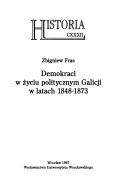
ISBN: 8322915772 Year: 1997 Volume: 1962 CXXXII Publisher: Wroclaw Uniwersytet Wroclawski
Abstract | Keywords | Export | Availability | Bookmark
 Loading...
Loading...Choose an application
- Reference Manager
- EndNote
- RefWorks (Direct export to RefWorks)
Book
ISBN: 8323201153 Year: 1987 Volume: vol 27
Abstract | Keywords | Export | Availability | Bookmark
 Loading...
Loading...Choose an application
- Reference Manager
- EndNote
- RefWorks (Direct export to RefWorks)
Galicia (Poland and Ukraine) in literature --- Galicie (Pologne et Ukraine) dans la littérature --- Galicië (Polen en Oekraïne) in de literatuur --- German prose literature --- History and criticism --- Galicia (Poland and Ukraine) --- Galichina (Poland and Ukraine) --- Galicja (Poland and Ukraine) --- Galizien (Poland and Ukraine) --- Halychyna (Poland and Ukraine) --- In literature. --- Intellectual life. --- German literature --- Addresses, essays, lectures --- Polish literature
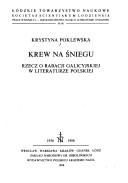
ISSN: 00760404 ISBN: 8304020688 Year: 1986 Volume: vol 86 Publisher: Lódz Lódzkie Towarzystwo Naukowe
Abstract | Keywords | Export | Availability | Bookmark
 Loading...
Loading...Choose an application
- Reference Manager
- EndNote
- RefWorks (Direct export to RefWorks)
Polish literature --- -Polish literature --- -History and criticism --- History and criticism --- Galicia (Poland and Ukraine) --- -Galichina (Poland and Ukraine) --- Galicja (Poland and Ukraine) --- Galizien (Poland and Ukraine) --- Halychyna (Poland and Ukraine) --- History --- -Literature and the uprising --- -History --- Galichina (Poland and Ukraine) --- Literature and the uprising.
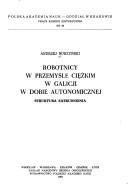
ISSN: 00793388 ISBN: 8304019086 Year: 1986 Volume: 46 Publisher: Kraków PAN, Oddzial w Krakowie
Abstract | Keywords | Export | Availability | Bookmark
 Loading...
Loading...Choose an application
- Reference Manager
- EndNote
- RefWorks (Direct export to RefWorks)
Working class --- History --- -Working class --- -Industries --- -Industrial production --- Industry --- Economics --- Commons (Social order) --- Labor and laboring classes --- Laboring class --- Labouring class --- Working classes --- Social classes --- Labor --- -History --- -Employment --- Galicia (Poland and Ukraine) --- -Galicia (Poland and Ukraine) --- -Galichina (Poland and Ukraine) --- Galicja (Poland and Ukraine) --- Galizien (Poland and Ukraine) --- Halychyna (Poland and Ukraine) --- Industries --- Industrial production --- Employment --- Poland --- Industries, Primitive
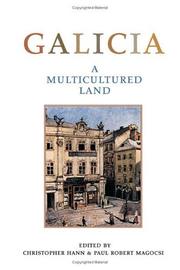
ISBN: 080203943X 080203781X 1442675144 0802065988 Year: 2005 Publisher: Toronto University of Toronto Press
Abstract | Keywords | Export | Availability | Bookmark
 Loading...
Loading...Choose an application
- Reference Manager
- EndNote
- RefWorks (Direct export to RefWorks)
Annotation
Cultural pluralism --- Ukrainians --- History --- Pluralism (Social sciences) --- Galicia (Poland and Ukraine) --- Ethnic relations --- Cultural diversity --- Diversity, Cultural --- Diversity, Religious --- Ethnic diversity --- Pluralism, Cultural --- Religious diversity --- Culture --- Cultural fusion --- Ethnicity --- Multiculturalism --- Galichina (Poland and Ukraine) --- Galicja (Poland and Ukraine) --- Galizien (Poland and Ukraine) --- Halychyna (Poland and Ukraine)
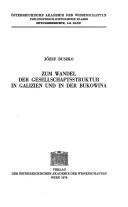
ISBN: 3700102674 Year: 1978 Volume: 343 Publisher: Wien : Verlag der
Abstract | Keywords | Export | Availability | Bookmark
 Loading...
Loading...Choose an application
- Reference Manager
- EndNote
- RefWorks (Direct export to RefWorks)
Galicia (Poland and Ukraine) --- Bukovina (Romania and Ukraine) --- Galicie (Pologne et Ukraine) --- Bucovine (Roumanie et Ukraine) --- Rural conditions --- Population --- Population. --- Conditions rurales --- -Rural conditions --- -Galicia (Poland and Ukraine) --- -Galichina (Poland and Ukraine) --- Galicja (Poland and Ukraine) --- Galizien (Poland and Ukraine) --- Halychyna (Poland and Ukraine) --- Bucovina (Romania and Ukraine) --- Bukovyna (Romania and Ukraine) --- Bukowina (Romania and Ukraine) --- Rural conditions. --- -Population --- Galichina (Poland and Ukraine)
Book
ISBN: 8323306656 Year: 1993 Publisher: Krakow : Nakładem Uniwersytetu Jagiellonskiego,
Abstract | Keywords | Export | Availability | Bookmark
 Loading...
Loading...Choose an application
- Reference Manager
- EndNote
- RefWorks (Direct export to RefWorks)
Turowski, Kazimierz Jozef --- -Correspondence --- Galicia (Poland and Ukraine) --- -Galichina (Poland and Ukraine) --- Galicja (Poland and Ukraine) --- Galizien (Poland and Ukraine) --- Halychyna (Poland and Ukraine) --- Intellectual life --- -Turowski, Kazimierz Jozef --- -Intellectual life --- -Turowski, Kazimierz Józef, --- Correspondence. --- Galichina (Poland and Ukraine) --- Turowski, Kazimierz Józef,
Book
Abstract | Keywords | Export | Availability | Bookmark
 Loading...
Loading...Choose an application
- Reference Manager
- EndNote
- RefWorks (Direct export to RefWorks)
German literature --- Jews --- Yiddish literature --- #GGSB: Jodendom --- #GGSB: Literatuur (letterkunde) --- Hebrews --- Israelites --- Jewish people --- Jewry --- Judaic people --- Judaists --- Ethnology --- Religious adherents --- Semites --- Judaism --- Jewish literature --- Fiction --- Translations into German --- Galicia (Poland and Ukraine) --- Galichina (Poland and Ukraine) --- Galicja (Poland and Ukraine) --- Galizien (Poland and Ukraine) --- Halychyna (Poland and Ukraine) --- Ethnic relations. --- Jodendom --- Literatuur (letterkunde)
Book
Abstract | Keywords | Export | Availability | Bookmark
 Loading...
Loading...Choose an application
- Reference Manager
- EndNote
- RefWorks (Direct export to RefWorks)
Galicia (Poland and Ukraine) --- Saxony (Germany) --- Silesia (Czech Republic) --- Free State of Saxony (Germany) --- Freistaat Sachsen (Germany) --- Land Sachsen (Germany) --- Sachsen (Germany) --- Saxony (Kingdom) --- Schlesien (Czech Republic) --- Slezsko (Czech Republic) --- Galichina (Poland and Ukraine) --- Galicja (Poland and Ukraine) --- Galizien (Poland and Ukraine) --- Halychyna (Poland and Ukraine) --- Economic conditions. --- Social geography --- Economic geography --- Saxony --- Silesia --- Poland: South
Book
ISBN: 1612348041 1612348068 9781612348049 9781612348063 1612347657 9781612347653 9781612347653 9781612348056 Year: 2015 Publisher: Lincoln
Abstract | Keywords | Export | Availability | Bookmark
 Loading...
Loading...Choose an application
- Reference Manager
- EndNote
- RefWorks (Direct export to RefWorks)
"Examination of the Battle for Galicia (23 August-11 September 1914), the most historically and strategically consequential of the Great War's three opening campaigns"-- "Although southern Poland and western Ukraine are not often thought of in terms of decisive battles in World War I, the impulses that precipitated the Battle for Galicia in August 1914 -- and the unprecedented carnage that resulted -- effectively doomed the Austro-Hungarian Empire just six weeks into the war. In Fall of the Double Eagle, John R. Schindler explains how Austria-Hungary, despite military weakness and the foreseeable ill consequences, consciously chose war in that fateful summer of 1914. Through close examination of the Austro-Hungarian military, especially its elite general staff, Schindler shows how even a war that Vienna would likely lose appeared preferable to the 'foul peace' the senior generals loathed. After Serbia outgunned the polyglot empire in a humiliating defeat, and the offensive into Russian Poland ended in the massacre of more than four hundred thousand Austro-Hungarians in just three weeks, the empire never recovered. While Austria-Hungary's ultimate defeat and dissolution were postponed until the autumn of 1918, the late summer of 1914 on the plains and hills of Galicia sealed its fate"--
HISTORY / Europe / Russia & the Former Soviet Union. --- HISTORY / Military / World War I. --- World War, 1914-1918 --- Campaigns --- Causes. --- Habsburg, House of. --- Russia. --- Российская Армия --- Rossiĭskai︠a︡ Armii︠a︡ --- History --- Austria --- Galicia (Poland and Ukraine) --- Galichina (Poland and Ukraine) --- Galicja (Poland and Ukraine) --- Galizien (Poland and Ukraine) --- Halychyna (Poland and Ukraine) --- History, Military.
| Listing 1 - 10 of 23 | << page >> |
Sort by
|

 Search
Search Feedback
Feedback About UniCat
About UniCat  Help
Help News
News